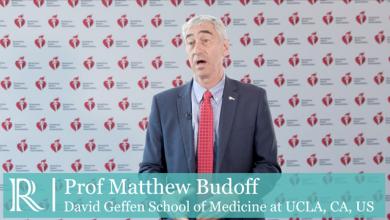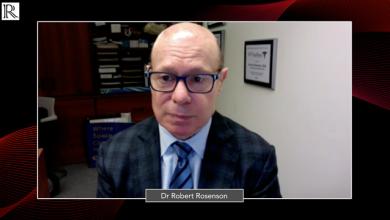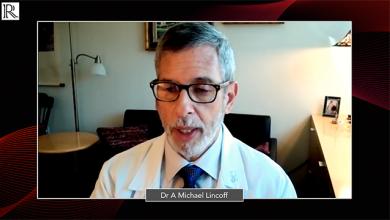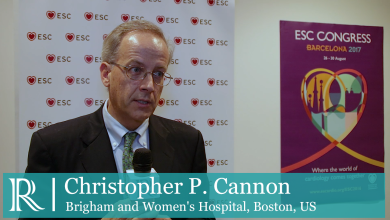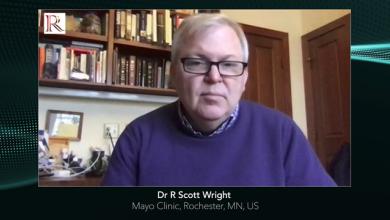Substantial progress in the treatment of atherosclerotic complications – in particular in secondary prevention – has led to a significant reduction of recurrent cardiovascular events. This has been through the use of pharmacological strategies including lipid-lowering drugs such as statins, beta-blockers, angiotensin-converting ensyme inhibitors and angiotensin receptor blockers, along with the introduction of early percutaneous coronary intervention in acute coronary syndrome with consecutive application of dual antiplatelet therapy.
Close Menu
View all - Electrophysiology & Arrhythmia
Atrial Arrhythmias
Atrial Fibrillation
Catheter Ablation of Cardiac Arrhythmias
Persistant AF using Cryoballoon
Real World Contact Force Ablation
Pacing, Defibrillators and Cardiac Resynchronisation Therapy
Stroke Prevention in Atrial Fibrillation
Ventricular Arrhythmias
Supraventricular Tachycardia
Atherosclerosis
Atherosclerosis
About
Media
Watch time: 3m 25s
Watch time: 7m 44s
Articles
Everything in Moderation: Investigating the U-Shaped Link Between HDL Cholesterol and Adverse Outcomes
Citation:
US Cardiology Review 2019;13(1):49–53
- Abstract
- Full text
- Login or register to view PDF.
- Permissions
- References
Permissions×
For commercial reprint enquiries please contact Springer Healthcare: ReprintsWarehouse@springernature.com.
For permissions and non-commercial reprint enquiries, please visit Copyright.com to start a request.
For author reprints, please email rob.barclay@radcliffe-group.com.
For permissions and non-commercial reprint enquiries, please visit Copyright.com to start a request.
For author reprints, please email rob.barclay@radcliffe-group.com.
- Views:
 137
137
- Downloads:
 0
0
- Citations: 4
Novel Pharmacologic Treatments for Cardiovascular Disease: A Practical Update
Citation:
US Cardiology Review 2017;11(2):98–104.
- Abstract
- Full text
- Login or register to view PDF.
- Permissions
- References
Permissions×
For commercial reprint enquiries please contact Springer Healthcare: ReprintsWarehouse@springernature.com.
For permissions and non-commercial reprint enquiries, please visit Copyright.com to start a request.
For author reprints, please email rob.barclay@radcliffe-group.com.
For permissions and non-commercial reprint enquiries, please visit Copyright.com to start a request.
For author reprints, please email rob.barclay@radcliffe-group.com.
- Views:
 1276
1276
- Downloads:
 0
0
Dyslipidemia: Current Therapies and Guidelines for Treatment
Citation:
US Cardiology Review 2017;11(1):10–5
- Abstract
- Full text
- Login or register to view PDF.
- Permissions
- References
Permissions×
For commercial reprint enquiries please contact Springer Healthcare: ReprintsWarehouse@springernature.com.
For permissions and non-commercial reprint enquiries, please visit Copyright.com to start a request.
For author reprints, please email rob.barclay@radcliffe-group.com.
For permissions and non-commercial reprint enquiries, please visit Copyright.com to start a request.
For author reprints, please email rob.barclay@radcliffe-group.com.
- Views:
 24539
24539
- Downloads:
 0
0
- Citations: 2
Proprotein Convertase Subtilisin/Kexin 9 (PCSK9) Inhibition in Patients With or at High Risk of Coronary Heart Disease
Citation:
US Cardiology Review 2017;11(1):16–7
- Abstract
- Full text
- Login or register to view PDF.
- Permissions
- References
Permissions×
For commercial reprint enquiries please contact Springer Healthcare: ReprintsWarehouse@springernature.com.
For permissions and non-commercial reprint enquiries, please visit Copyright.com to start a request.
For author reprints, please email rob.barclay@radcliffe-group.com.
For permissions and non-commercial reprint enquiries, please visit Copyright.com to start a request.
For author reprints, please email rob.barclay@radcliffe-group.com.
- Views:
 341
341
- Downloads:
 0
0










